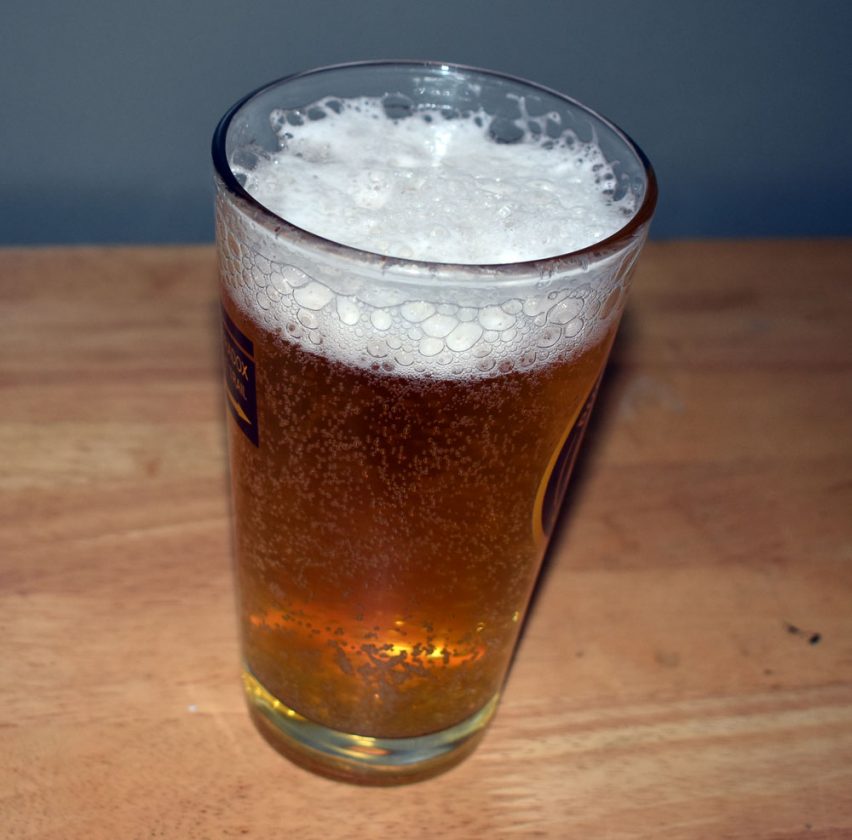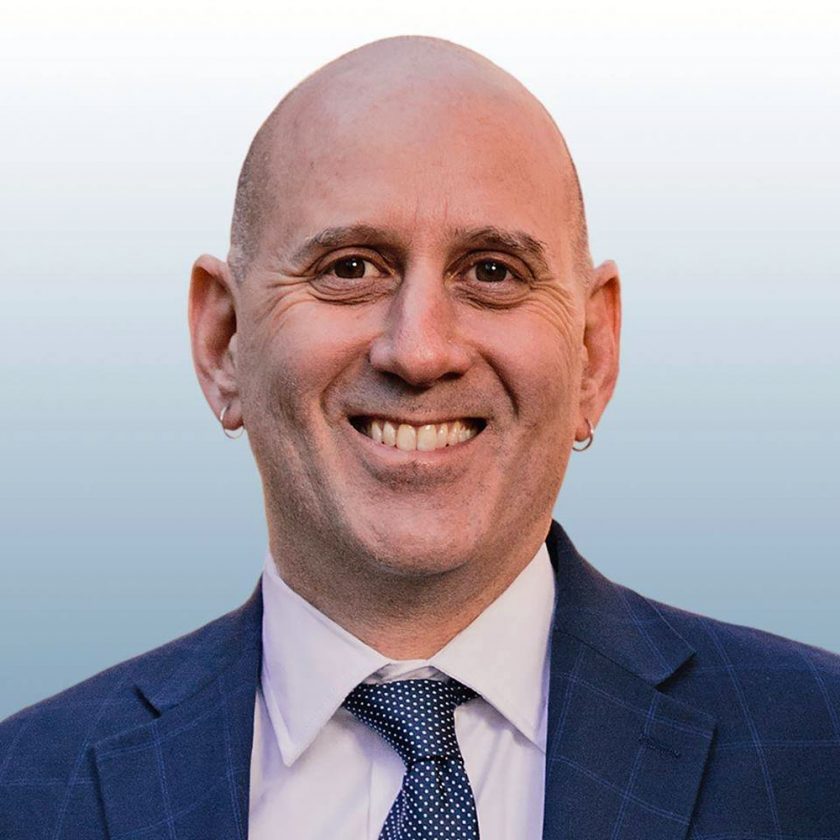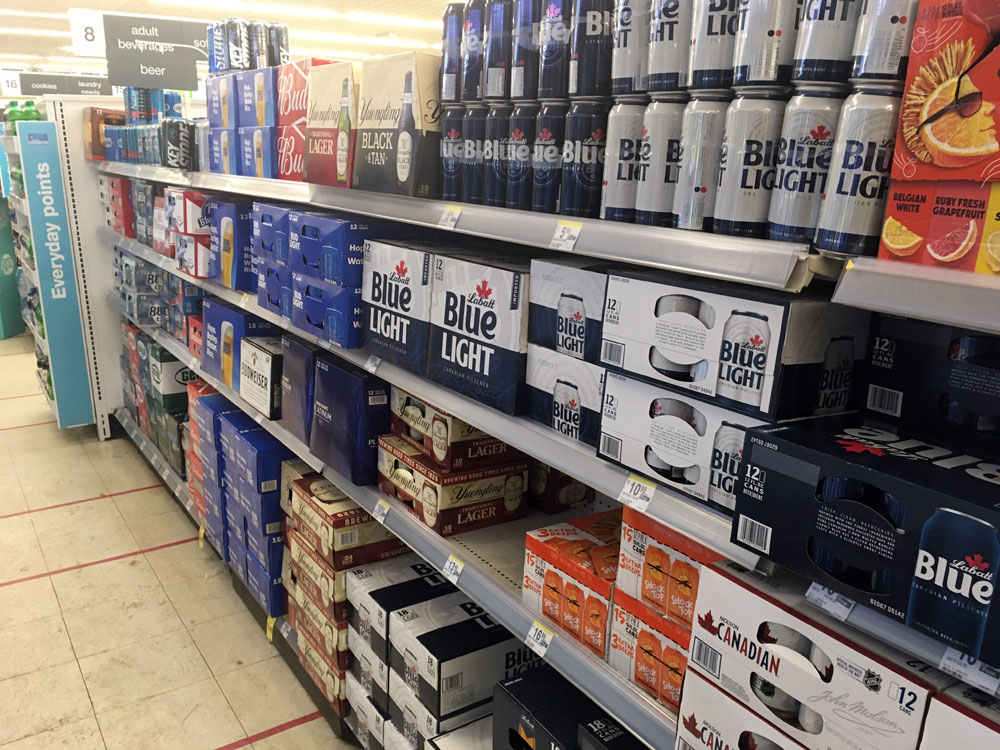Debate gets frothy over proposed beer tax hike
- (Enterprise photo — Griffin Kelly)
- The beer aisle at the Walgreens drug store in Saranac Lake is seen Friday. (Enterprise photo — Griffin Kelly)
- Bartender Jacqueline Clark pours beer at the Lake Placid Pub & Brewery in January. (Enterprise photo — Griffin Kelly)
- Assemblyman Harvey Epstein (Photo provided)
- Chris Ericson owns the Lake Placid Pub and Brewery and the Big Slide Brewery & Public House in Lake Placid. He’s also the president of the New York State Brewers Association. (Enterprise photo — Matthew Turner)

(Enterprise photo — Griffin Kelly)
LAKE PLACID — A state assemblyman wrote a bill that proposes more than doubling the tax on beer to help fund public higher education. However, the leader of the state’s brewers’ association sees it as an attack on their way of life.
Harvey Epstein, D-Brooklyn, represents the 74th District, which consists of the East Side of Manhattan. He recently proposed raising the tax on beer from 14 to 30 cents per gallon, roughly a 107% increase.
The tax is solely based on production. If a brewery makes 5,000 gallons of beer in a year but sells only 2,000 gallons, it still gets taxed for all of it.
“This would be paid at the distributor level,” Epstein said in a phone interview Thursday. “They could then pass along that cost to bar owners and the customer, but you don’t really know how it’s going to play out.”
He said the tax should increase a 12-ounce bottle of beer by 1.5 cents.

Assemblyman Harvey Epstein (Photo provided)
“No one generally wants to pay more taxes, but a penny-and-a-half is not that much,” he said.
New York is on the lower end of the scale for states’ beer taxes. Wyoming has the lowest at 2 cents, and Tennessee has the highest at $1.29. Epstein’s plan would raise New York’s beer tax to the same level as its tax on wine, which is already 30 cents per gallon produced.
Chris Ericson owns the Lake Placid Pub and Brewery and the Big Slide Brewery & Public House. He’s also the president of the New York State Brewers Association. He does not agree with the bill.
“Over doubling your tax is just a seemingly ridiculous thing,” he said in an interview Monday. “I think it’s particularly egregious that you’re attacking a small and growing, both agricultural and industrial, manufacturing industry in the state of New York.
“All of the sudden, it’s like, ‘Here’s a growing industry, and it’s beer. Let’s see if we can draw some funds out of them.’ It just seems kind of haphazard and kind of irresponsible.”

Chris Ericson owns the Lake Placid Pub and Brewery and the Big Slide Brewery & Public House in Lake Placid. He’s also the president of the New York State Brewers Association. (Enterprise photo — Matthew Turner)
Similar bills have been proposed in the past. In May 2019, Assemblyman Michael DenDekker, D-Jackson Heights, proposed sales tax increases to beer, wine and spirits. The extra money would have gone toward substance abuse treatment. It never passed.
In 2018, the beer tax brought in approximately $45 million for the state’s general fund. Epstein said increasing the tax could bring in an additional $51 million — $96 million in total. He proposed that half of the money generated by the tax go to the SUNY and CUNY systems.
“This would be general operating money for SUNY and CUNY,” he said. “Every year when tuition goes up, (the state) gives less and less money.”
The SUNY and CUNY budgets for the 2019 fiscal year combined were about $14 billion. The beer tax revenue Epstein is proposing would cover roughly 0.35% of the total cost for the school systems. (Correction: An earlier version of this article incorrectly said 3.5% instead of 0.35%.)
The state Tuition Assistance Program helps fund college so students don’t have to pay entirely out of pocket or through scholarships. However, the gap between what the state is providing and how much college costs is getting wider. This is called the TAP gap, and Epstein said he wants to close it.

Bartender Jacqueline Clark pours beer at the Lake Placid Pub & Brewery in January. (Enterprise photo — Griffin Kelly)
Baruch College, which is in the CUNY system, is in Epstein’s district. He described it as an institution known for educating students from lower-income backgrounds and giving them opportunities to improve their financial statuses.
“It was the No. 1 college in the U.S. that helped change income opportunities,” he said. “Now, they’re telling us they don’t have the resources to make the school function. That’s the opposite of what we want to be doing.
“When I went to CUNY (School of Law), the tuition only had to cover a third of the cost to operate the college. Now, tuition covers two-thirds.”
There are 26 CUNY schools and 64 SUNY schools, including North Country Community College, which has campuses in Saranac Lake, Malone and Ticonderoga.
As a business owner, Ericson said he doesn’t want taxes to increase. As a craft brewing association leader, he said a small tax increase would make sense if it was linked to an initiative that furthers the beer market.

The beer aisle at the Walgreens drug store in Saranac Lake is seen Friday. (Enterprise photo — Griffin Kelly)
“Yes, (the money) would go to the SUNY program, but what does that tie to the microbrewing industry?” he said.
Ericson said it would make more sense to raise the tax to 16 cents and have that extra 2 cents go toward something like a hop breeding program in the Cornell Cooperative Extension.
“I think (something like) that would be a lot easier for people to swallow,” he said. “It would have to be small. It would have to be targeted. And it would have to benefit our industry.”
Epstein said strategically changing taxes is better than axing something entirely from a state budget and pooling that money elsewhere.
“You have to spread things out in a thoughtful way,” he said. “That’s why we have a tax on tobacco, a tax on vaping, an income tax. You need to have a diverse tax base, and (the beer tax increase) would be adding to that diversity.
“The reason this also works — if you think about connecting revenue sources and need, the lottery funds public education. Those funding streams are critical. Groups know year by year what their funding looks like. It’s really important to have stable funding.”
Ericson said he’s all for public funding of higher education, but he thinks there are better ways to achieve those goals.
“It seems like you’re putting an enormous burden on a very, very small, growing industry that employs a lot of people, and you’re not solving your problem,” he said. “It’s a huge deal for us and not for them. It doesn’t really get them anywhere.”
In 2017, Congress passed a bill that decreased the federal beer excise tax from $7 to $3.50 per barrel.
“The difference between a $3.50 tax and a $7 tax is absolutely nothing,” Ericson said. “It is a drop of water in the ocean of the federal budget.”
Epstein said he didn’t talk to people working in the beer industry before proposing the tax increase.
“I had not done that,” he said. “I’ve mostly spoken to people in higher education, constituents and students. This will affect the largest part of the beer industry, your Budweisers of the world.
“I know there are concerns around the smaller operators, and I’m happy to hear from them, but the smaller venues are not generating the revenue we’re seeing from international players.”
Ericson said it was reckless for Epstein to not ask how the bill could affect business owners and their employees.
“They don’t know the facts,” he said. “They don’t know how hard it is to operate this level of business. Most of these breweries are in the danger zone of number of employees and number of sales. Every penny really counts in this industry.”
Ericson agreed much of the money would come from big brewers, but he said it would still hurt the smaller businesses.
“It certainly would affect (big breweries) more,” he said. “If Anheuser-Busch and Genesee are the two huge breweries in the state, there are 480 other non-Baldwinsville, non-Genesee breweries that are going to have to bear the brunt of this tax increase, too.”
According to the New York State Brewers Association, “In 2018, New York State was the 6th largest beer producing state in the country.”
Epstein’s hope is to get the beer tax hike into the 2021 state budget.
“You never know in Albany. I’ve written bills that didn’t have legs but passed, and I’ve written bills that had legs and didn’t pass,” he said. “Gov. Andrew Cuomo didn’t put it in his budget this year, but I think there are still opportunities.”










